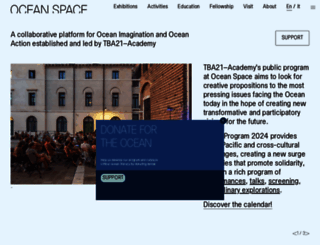Ocean Space
Page Load Speed
2.2 sec in total
First Response
200 ms
Resources Loaded
1.5 sec
Page Rendered
481 ms

About Website
Visit ocean-space.org now to see the best up-to-date Ocean Space content and also check out these interesting facts you probably never knew about ocean-space.org
A collaborative platform for Ocean Imagination and Ocean Action
Visit ocean-space.orgKey Findings
We analyzed Ocean-space.org page load time and found that the first response time was 200 ms and then it took 2 sec to load all DOM resources and completely render a web page. This is quite a good result, as only 40% of websites can load faster.